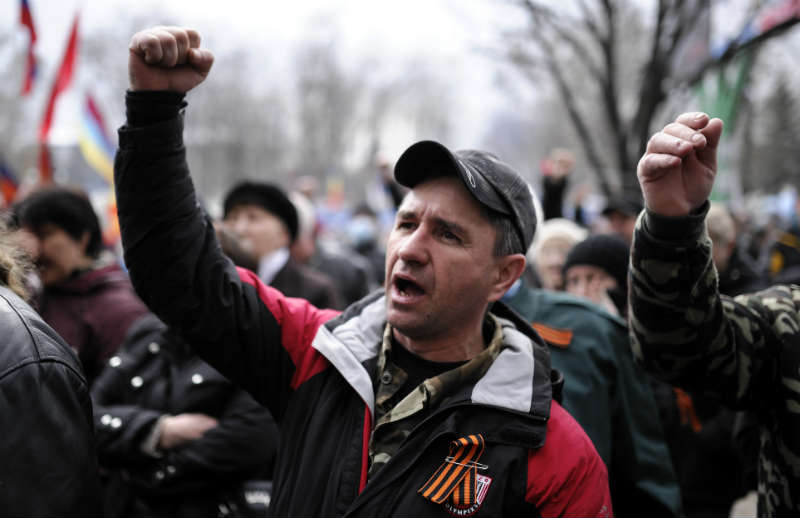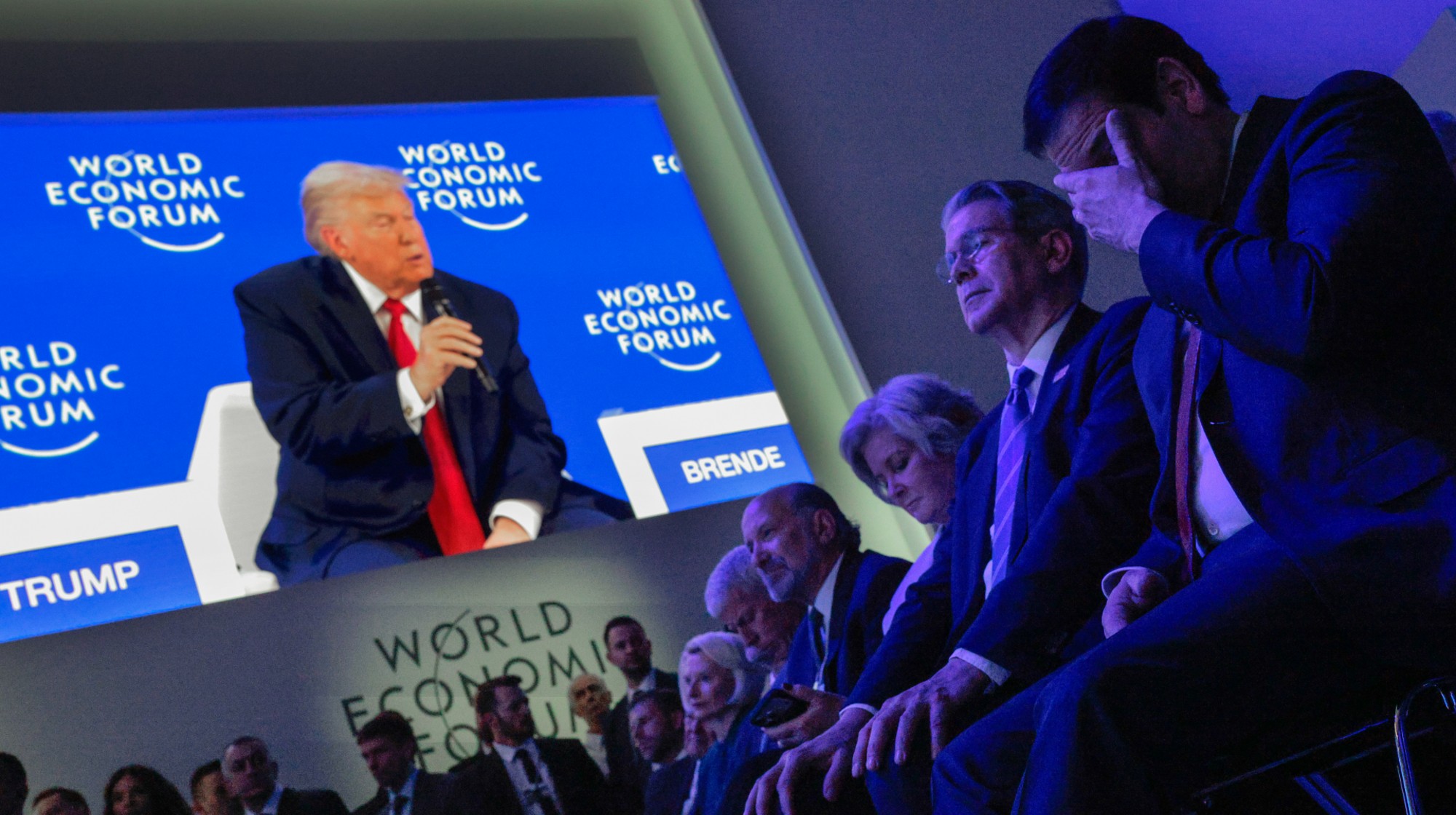Ukraine crisis: EU and Nato's intellectual shambles exposed
A quarter of a century after the Cold War, dreams of harmony and consensus are shot to pieces

A free daily email with the biggest news stories of the day – and the best features from TheWeek.com
You are now subscribed
Your newsletter sign-up was successful
IN EASTERN Ukraine, the streets now rule, whatever Kiev and Moscow may say.
Ukraine’s ill-starred interim President Oleksandr Turchynov threatened to send in his armed forces to oust the pro-Russian separatists in their makeshift fortresses in official buildings in centres such as Donetsk and Sloviansk.
The deadline passed and the separatists had not budged, or been budged. Sloviansk, hard on the border with Russia, has roadblocks of burning tyres at the main entrance and exits to the town.
The Week
Escape your echo chamber. Get the facts behind the news, plus analysis from multiple perspectives.

Sign up for The Week's Free Newsletters
From our morning news briefing to a weekly Good News Newsletter, get the best of The Week delivered directly to your inbox.
From our morning news briefing to a weekly Good News Newsletter, get the best of The Week delivered directly to your inbox.
The dynamic of the streets in more than half a dozen towns where the Russian flag has been raised is unpredictable. The volatility of gangs out for vengeance threatens more than anything else to tip the region to war. And it may be the kind of war that the 40,000 Russian troops on the other side of the border will find hard to control.
The problem for the capitals - Kiev, Moscow, Washington, Berlin - is that they are no longer in charge. They are being driven by events.
As for the EU and Nato in Brussels, and the UN in New York, they have barely begun to formulate a plan A, before having to resort to a plan B or even C.
They seem to have nothing concrete or coherent in their intellectual lockers to reduce the current tension, let alone hint at a long-term solution.
A free daily email with the biggest news stories of the day – and the best features from TheWeek.com
This is no re-run of the crisis that led to Russia’s successful annexation of the Crimea. There Putin brilliantly played a trump card of democracy by the hastily cobbled referendum – Moscow knowing full well that the plebiscite would deliver what it wanted.
There may be talk of a referendum now – the insurgents in Donetsk have demanded one repeatedly – but even if it could be done, there is no guarantee it would play to Moscow’s script. It would merely encourage further grievance and violence.
The language of the Russian foreign minister, Sergei Lavrov, and Moscow’s ambassador to the UN, Vitaly Churkin, is at the same time threatening and hollow. They say that Kiev is in the hands of neo-Fascists and anti-Semites - a nonsense the Chief Rabbi of Kiev has denounced - and that the orders of the acting president are "criminal".
Implicit in this is the suggestion that the 40,000 Russian forces now on the border may have to be brought in as "peacekeepers". The problem is that the formations of troops are not configured for policing – just look how long it took British forces to adapt to the role in Northern Ireland.
President Putin’s forces would soon find themselves facing another messy guerrilla war – on top of the one he already has in Chechnya and the Caucasus.
Both sides are now challenged by the fact that there is no centre of gravity to the present upsurge of violence across the east of Ukraine. It is very much a do-it-yourself rebellion with no central command and no political headquarters.
Kiev is faced with a similar problem. The command and control of the forces loyal to the provisional government seems fragmentary and chaotic – with units in the Crimea all but abandoned. In short, Kiev now seems acutely dysfunctional – something the regime there has to fix in the short-term if it is to survive.
Moscow faces grievous problems too. Putin’s Russia is now entering a long period of confrontation with the EU, Nato and the US. The most potent instruments at his disposal are unlikely to help Moscow in the long-term. Putin can threaten to turn off the gas, but that it is likely to cause a blowback on Moscow’s own money markets, as we have seen already.
There has been some speculation that Moscow could make mischief by increasing its backing of Bashar al Assad's murderous regime in Syria, or even supplying Russia’s most effective array of air defence missiles to Iran. Helping Assad enrages the Sunni jihadis, who have strong links inside Russia’s own borders.
But the leadership of Iran's President Ruhani and Foreign Minister Zarif is far too canny to jeopardise the recent gain in Iran’s negotiations with the US and the West by buying a diplomatic trick from Moscow.
The longer the crisis persists, the greater the risk to Putin’s legacy at its weakest point - the Russian economy. Despite the boom of the oligarchs and the revenues from gas, the economy is still the basket case it was at the end of the Soviet era, unreformed, crapulous and corrupt. Even acquiring the industrial heartland of eastern Ukraine would be no gain – for this is the rustbelt of old Soviet heavy manufacture.
The UN Security Council has met ten times about Ukraine in the last few weeks. EU ministers are gathering yet again this week, and no doubt will issue more stern words about Moscow’s behaviour.
The brave vocabulary cannot conceal the failure of both the EU and Nato to fashion a common security strategy for their own backyard. The lack of coherent thinking and planning has allowed a vital part of the European neighbourhood to drift to the brink of war.
A new security deal must be matched by a coherent policy towards energy – and here Angela Merkel is in the spotlight. Germany’s dependence on Russian gas and its own copious supplies of cheap and noxious lignite coal, courts political, economic and - as the UN report on climate change reminds us - ecological nemesis.
For too long the western world and its agencies comforted themselves at the end of the Cold War with the thesis of Francis Fukuyama’s The End of History.
But globalisation has not brought the harmony and consensus so many expected in 1989. It has brought a great deal of discord, exclusion and fragmentation – and fragments such as the autonomous republics of eastern Ukraine are now looking pretty lethal.
is a writer on Western defence issues and Italian current affairs. He has worked for the Corriere della Sera in Milan, covered the Falklands invasion for BBC Radio, and worked as defence correspondent for The Daily Telegraph. His books include The Inner Sea: the Mediterranean and its People.
-
 The environmental cost of GLP-1s
The environmental cost of GLP-1sThe explainer Producing the drugs is a dirty process
-
 Greenland’s capital becomes ground zero for the country’s diplomatic straits
Greenland’s capital becomes ground zero for the country’s diplomatic straitsIN THE SPOTLIGHT A flurry of new consular activity in Nuuk shows how important Greenland has become to Europeans’ anxiety about American imperialism
-
 ‘This is something that happens all too often’
‘This is something that happens all too often’Instant Opinion Opinion, comment and editorials of the day
-
 Epstein files topple law CEO, roil UK government
Epstein files topple law CEO, roil UK governmentSpeed Read Peter Mandelson, Britain’s former ambassador to the US, is caught up in the scandal
-
 Iran and US prepare to meet after skirmishes
Iran and US prepare to meet after skirmishesSpeed Read The incident comes amid heightened tensions in the Middle East
-
 Israel retrieves final hostage’s body from Gaza
Israel retrieves final hostage’s body from GazaSpeed Read The 24-year-old police officer was killed during the initial Hamas attack
-
 China’s Xi targets top general in growing purge
China’s Xi targets top general in growing purgeSpeed Read Zhang Youxia is being investigated over ‘grave violations’ of the law
-
 Panama and Canada are negotiating over a crucial copper mine
Panama and Canada are negotiating over a crucial copper mineIn the Spotlight Panama is set to make a final decision on the mine this summer
-
 Trump backs off Greenland threats, declares ‘deal’
Trump backs off Greenland threats, declares ‘deal’Speed Read Trump and NATO have ‘formed the framework for a future deal,’ the president claimed
-
 The rise of the spymaster: a ‘tectonic shift’ in Ukraine’s politics
The rise of the spymaster: a ‘tectonic shift’ in Ukraine’s politicsIn the Spotlight President Zelenskyy’s new chief of staff, former head of military intelligence Kyrylo Budanov, is widely viewed as a potential successor
-
 Why Greenland’s natural resources are nearly impossible to mine
Why Greenland’s natural resources are nearly impossible to mineThe Explainer The country’s natural landscape makes the task extremely difficult